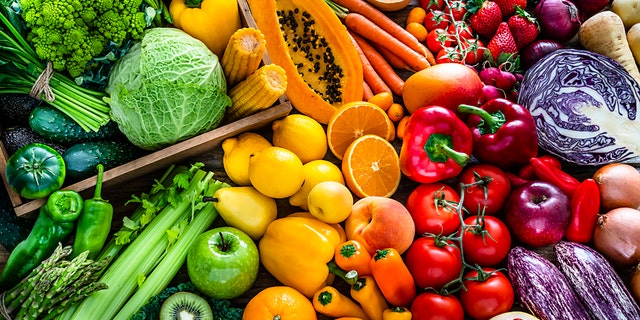How many servings of healthy-living” target=”_blank”>fruits and veggies< Association, aims to provide an answer.
In an analysis of data representing some 2 million people around the world, researchers identified five daily servings of fruits and veggies — two servings of fruit and three of vegetables, to be exact — as the ideal ratio to live a longer life. Diets that are rich in fruits and vegetables “help reduce [the] risk for numerous chronic health conditions that are leading causes of death, including cardiovascular disease and cancer,” per a news release on the findings.

It’s important to note that not all fruits and vegetables are created equal, with the researchers also finding that the greatest benefits were seen in those who ate green leafy vegetables, such as spinach, lettuce, and kale.
(iStock)
For the study, researchers analyzed data from the Nurses’ Health Study and the Health Professionals Follow-Up Study, two robust studies that included more than 100,000 adults who were monitored for up to three decades.
The researchers noted that both datasets “included detailed dietary information repeatedly collected every two to four years.”
POOR SPERM QUALITY LINKED TO PHONE AND LAPTOP USE AT NIGHT, STUDY SAYS
For the meta-analysis, the researchers pooled data on fruit and veggie intake and death from 26 studies that included nearly 2 million participants across 29 countries, finding that consuming five servings of fruits and vegetables each day was associated with the lowest risk of death. Eating more than five servings “was not associated with additional benefits,” they found.
Additionally, the researchers through the meta-analysis also determined that two servings of fruit and three of vegetables were “associated with the great longevity,” noting that those who ate five servings a day had a 13% lower risk of death overall, including a 12% lower risk of death from cardiovascular disease, including heart disease and stroke. They also were found to have a 10% lower risk of death from cancer, as well as a 35% lower risk of death from respiratory diseases, such as chronic obstructive pulmonary disease (COPD).
It’s important to note that not all fruits and vegetables are created equal, with the researchers also finding that the greatest benefits were seen in those who ate green leafy vegetables, such as spinach, lettuce, and kale. Benefits were also greater for those who ate vegetables “rich in beta carotene and vitamin C, such as citrus fruits, berries, and carrots,” the researchers said.
Meanwhile, “starchy vegetables, such as peas and corn, fruit juices and potatoes were not associated with reduced risk of death from all causes or specific chronic diseases,” they said.
“Our analysis in the two cohorts of U.S. men and women yielded results similar to those from 26 cohorts around the world, which supports the biological plausibility of our findings and suggests these findings can be applied to broader populations,” said lead study author Dong D. Wang, M.D., Sc.D., an epidemiologist, nutritionist and a member of the medical faculty at Harvard Medical School and Brigham and Women’s Hospital in Boston, in a statement.
“This amount likely offers the most benefit in terms of prevention of major chronic disease and is a relatively achievable intake for the general public,” he said of the five servings. “We also found that not all fruits and vegetables offer the same degree of benefit, even though current dietary recommendations generally treat all types of fruits and vegetables, including starchy vegetables, fruit juices, and potatoes, the same.”
“This research provides strong evidence for the lifelong benefits of eating fruits and vegetables and suggests a goal amount to consume daily for ideal health. Fruits and vegetables are naturally packaged sources of nutrients that can be included in most meals and snacks, and they are essential for keeping our hearts and bodies healthy,” added Anne Thorndike, M.D., M.P.H., chair of the American Heart Association’s nutrition committee and an associate professor of medicine at Harvard Medical School in Boston, in a statement.

Leave A Comment
You must be logged in to post a comment.